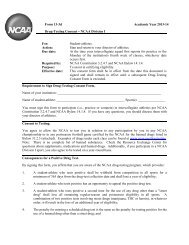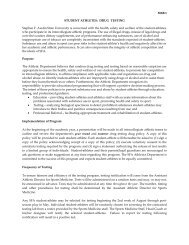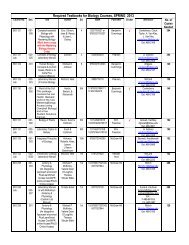NCAA Medical Exception Documentation Reporting Form to Support ...
NCAA Medical Exception Documentation Reporting Form to Support ...
NCAA Medical Exception Documentation Reporting Form to Support ...
- No tags were found...
You also want an ePaper? Increase the reach of your titles
YUMPU automatically turns print PDFs into web optimized ePapers that Google loves.
<strong>NCAA</strong> Guidelines <strong>to</strong> Document ADHD Treatment with Banned Stimulant MedicationsAddendum <strong>to</strong> the January 2009 GuidelinesQ & A March 2009Updated July 2010(*New Questions)1. *What is the outcome in the case of a student-athlete who tests positive for stimulantmedication prescribed <strong>to</strong> them by a legitimate medical provider but has no documentation<strong>to</strong> support the diagnosis, and who subsequently undergoes an evaluation that determinesthe student-athlete does not have ADD/ADHD? This case above will be reviewed under the drug-testing appeals process. Theoutcome of that process may be not <strong>to</strong> penalize the student-athlete, but require thestudent-athlete <strong>to</strong> discontinue using the banned medication.2. *Is the documentation of a diagnostic assessment required <strong>to</strong> meet the <strong>NCAA</strong> <strong>Medical</strong><strong>Exception</strong> Policy for treatment with stimulants for ADD/ADHD the same as that requiredfor academic accommodations through the institution’s disability resource center?No, the diagnostic evaluation <strong>to</strong> meet the <strong>NCAA</strong> documentation criteria does notneed <strong>to</strong> include the full battery of testing for learning disabilities generally conductedfor the institution’s disability resource center review. In order <strong>to</strong> meet <strong>NCAA</strong>criteria, the institution must submit documentation of the clinicians write up, <strong>to</strong>include a comprehensive his<strong>to</strong>ry and assessment as it relates <strong>to</strong> DSM criteria forADHD, including the measures used <strong>to</strong> rate the student-athlete’s symp<strong>to</strong>ms ofattention deficit. This evaluation should be accompanied by a signed letter from theprescribing physician describing the course of treatment and current prescription.3. Why is the <strong>NCAA</strong> instituting a stricter application of the medical exception policy for theuse of banned stimulant medications <strong>to</strong> treat ADHD?The stricter application reflects a stronger stand on policy enforcement, protecting thestudent-athlete competing while using these stimulants, and the integrity of the sport.This stricter application of the medical exception policy is intended <strong>to</strong> provideclearer documentation of the student-athlete’s evaluation, and not intended <strong>to</strong>replace the clinician’s evaluation and treatment.As experienced across campus, more and more college students-athletes are beingtreated with stimulant medications for ADHD. These stimulants are banned for use in<strong>NCAA</strong> competition for both performance and health reasons, and using them mayresult in a positive drug test and loss of eligibility, unless the student-athlete providesadequate documentation of a diagnostic evaluation for ADHD and appropriatemoni<strong>to</strong>ring of treatment. In recent years, the number of student-athletes testing





